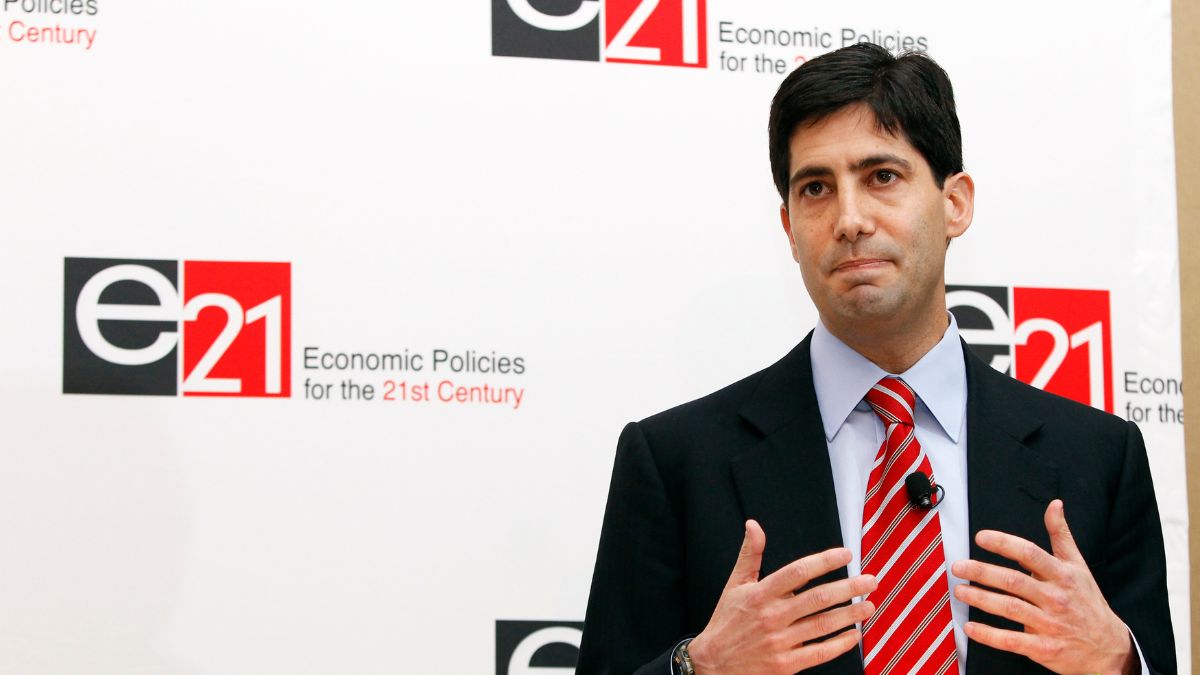Amid renewed criticism of Federal Reserve Chair Jerome Powell, United States President Donald Trump has been exploring options to restructure the leadership of the US central bank.
Central to these discussions is former Fed Governor Kevin Warsh, a seasoned financial policymaker with longstanding ties to both Republican administrations and Wall Street.
According to reports first published by The Wall Street Journal, Trump has privately deliberated the idea of removing Powell before the end of his statutory term, which expires in May 2026.
Conversations about the matter, including the prospect of appointing Warsh as Powell’s successor, have occurred over several months — notably at Trump’s Mar-a-Lago residence in February, and even more recently in March.
While Trump has yet to reach a definitive conclusion, his growing public discontent with Powell has reignited attention on the legal boundaries of such a decision and on the man widely viewed as the likely frontrunner to take over the role.
Trump’s escalating rhetoric against Powell
Over the course of several weeks, Trump has intensified his criticism of Powell, repeatedly expressing frustration with the Federal Reserve’s handling of monetary policy.
In a strongly worded Truth Social post, Trump said Powell is “always TOO LATE AND WRONG,” adding, “Powell’s termination cannot come fast enough!” During a separate media event in the Oval Office, the US president declared, “If I want him out, he’ll be out of there real fast, believe me.”
Despite Trump’s statements, the law governing the Federal Reserve imposes strict conditions under which a chair may be removed.
The Federal Reserve Act of 1913 states that central bank officials may only be dismissed “for cause.” Powell has previously said his removal would not be “permitted under the law,” a view widely shared by legal experts.
Nevertheless, Trump has shown a willingness in the past to challenge institutional precedents.
Reports indicate that some of his advisors have discussed the feasibility of Powell’s removal all the way up to the level of the Supreme Court, underscoring the potentially seismic legal and political battle that could ensue if Trump were to act on his threat.
Who is Kevin Warsh?
Amid this uncertainty, attention has turned to Kevin Warsh, who has reportedly been consulted directly by Trump about the future of the Fed’s leadership.
The two men have met multiple times in private settings, including at Mar-a-Lago earlier this year. While Warsh is said to have counseled against the idea of firing Powell before his term ends, his profile and credentials make him a top candidate to lead the central bank in a second Trump administration.
Warsh served as a Federal Reserve governor from 2006 to 2011, appointed by then-US President George W Bush. He played a central role during the 2008 financial crisis, acting as the Fed’s main liaison to major financial institutions and participating in crisis-management efforts that shaped the US economy’s recovery path.
He was also the central bank’s representative to the Group of Twenty (G-20) and acted as a key link between the Fed and emerging and developed economies in Asia.
Before his time at the Fed, Warsh worked at Morgan Stanley as a vice president and executive director in the firm’s mergers and acquisitions division.
He later served as Special Assistant to the President for Economic Policy and as Executive Secretary of the White House National Economic Council during the George W Bush administration.
More recently, Warsh has remained involved in both academic and advisory roles. He is currently the Shepard Family Distinguished Visiting Fellow in Economics at Stanford University’s Hoover Institution and a lecturer at Stanford’s Graduate School of Business.
He also serves on the Panel of Economic Advisers of the Congressional Budget Office and is affiliated with the Group of Thirty, a prominent international forum of financial and economic leaders. Warsh was also formerly a member of the steering committee of the Bilderberg Group.
Kevin Warsh’s economic views & Fed criticism
In addition to his resume, Warsh’s policy stances have drawn the attention of Trump and his economic aides. He is known as a fiscal and monetary hawk and has expressed pointed criticism of the Fed’s recent policies.
In a 2022 op-ed for The Wall Street Journal, Warsh wrote that crypto technologies posed both “promise and peril for the American-led global financial system” and urged the Fed to explore a central bank digital currency (CBDC) to stay competitive with innovations like China’s digital yuan.
Warsh has been vocal about the roots of inflation in recent years. In the same publication, he attributed rising prices to “a government that spent too much and a central bank that printed too much.”
While many mainstream economists cite pandemic-induced supply and demand imbalances as primary inflation drivers, Warsh’s critique has resonated with fiscal conservatives.
He has also argued that the Federal Reserve should maintain independence not only in word but in action. Referencing minutes from a past Fed meeting, Warsh noted concerns that the central bank had factored in political developments — such as Trump’s policies — in its inflation outlook, something he believes should be avoided.
In a March Fox Business interview, Warsh commented on the effects of Trump’s trade tariffs and the broader economic landscape, stating, “The president inherited a fiscal and economic and regulatory mess, and it’s going to take a little digging out to be on a stronger platform for growth.”
Addressing the Fed’s handling of inflation, he added, “Inflation is a choice, and the Fed has made a lot of bad choices over these last several years.” On potential remedies, Warsh said, “The president has to take matters into his own hands and try to kill inflation by reducing government spending.”
Warsh’s ties to Trump’s inner circle
Warsh’s connection to Trump is not new. During Trump’s first term in office, Warsh was seriously considered for the role of Fed Chair in 2017 before the position ultimately went to Powell.
In the lead-up to Trump’s second-term economic planning, Warsh again served as an advisor on the transition team. He was also a contender for US Treasury Secretary before Trump settled on Scott Bessent — a decision seen by many analysts as keeping Warsh available for a potential Fed appointment.
Bessent has since said that the administration will begin formally evaluating candidates to replace Powell “sometime in the fall.” reported Bloomberg.
He stated that “monetary policy is a jewel box that’s got to be preserved,” underscoring the gravity of the role and the need for stability, even amid possible leadership changes.
Warsh’s personal life also connects him to influential figures in Trump’s extended network. He is married to Jane Lauder, the granddaughter of cosmetics magnate Estée Lauder. Jane Lauder currently serves as Global Brand President for Clinique and has worked at the Estée Lauder Companies for years.
Warsh’s father-in-law, Ronald Lauder — a prominent Republican donor — is known to have influenced some of Trump’s more unconventional geopolitical interests, including his widely reported interest in acquiring Greenland.
Warsh’s background
Kevin Maxwell Warsh was born on April 13, 1970, in Albany, New York, and raised in Loudonville. He is the youngest of three children. After graduating from Shaker High School in Latham, he earned a Bachelor of Arts degree in public policy from Stanford University in 1992, concentrating on economics and political science.
He then obtained a JD from Harvard Law School in 1995, graduating cum laude. He also pursued coursework at both MIT Sloan School of Management and Harvard Business School, focusing on market economics and debt capital markets.
His early career achievements and policy acumen earned him a spot on Fortune Magazine’s “40 Under 40” list in 2009.
Known for his sharp analytical mind and crisis management experience, Warsh is regarded by many in financial and political circles as a technocrat with the experience necessary to lead the Fed — should the opportunity arise.
He has also invested in fintech and crypto-related ventures, including the now-defunct crypto platform Basis and asset management firm Bitwise, which offers cryptocurrency index funds, according to PitchBook data.
Also Watch:
With inputs from agencies


)
)
)
)
)
)
)
)
)